
JOURNAL OF VALUE INQUIRY
Scope & Guideline
Advancing Discourse at the Intersection of Values and Society
Introduction
Aims and Scopes
- Value Theory and Ethics:
The journal emphasizes the exploration of various ethical theories, including virtue ethics, consequentialism, and deontological ethics, providing a platform for rigorous philosophical analysis. - Moral Philosophy and Responsibility:
It delves into moral issues surrounding responsibility, agency, and the implications of moral actions, encouraging discourse on individual and collective moral obligations. - Cultural and Historical Perspectives on Values:
The journal addresses the influence of cultural and historical contexts on moral philosophy, drawing insights from ancient philosophies like Confucianism and contemporary ethical dilemmas. - Interdisciplinary Approaches to Value Inquiry:
The journal welcomes interdisciplinary contributions that intersect philosophy with fields such as psychology, political science, and environmental studies, enhancing the understanding of values. - Social Justice and Political Philosophy:
It explores themes related to justice, authority, and rights, focusing on how philosophical inquiry can inform social and political practices.
Trending and Emerging
- Applied Ethics and Social Issues:
A growing number of papers address pressing social issues such as climate change, economic inequality, and public health ethics, indicating a trend towards applying philosophical inquiry to real-world problems. - Collective Responsibility and Agency:
Recent publications have increasingly focused on the notions of collective responsibility, the agency of groups, and how these concepts interact with moral obligations, reflecting contemporary debates in social and political philosophy. - Environmental Ethics and Sustainability:
The rise of environmental concerns has led to a significant increase in discussions surrounding ethics related to sustainability, animal rights, and ecological responsibility, highlighting the journal's engagement with urgent global challenges. - Emotional and Psychological Dimensions of Ethics:
There is an emerging focus on the emotional and psychological aspects of moral reasoning, such as empathy, motivation, and the role of emotions in ethical decision-making, showcasing a more nuanced understanding of moral psychology. - Intersections of Technology and Ethics:
With the rise of technology, papers exploring the ethical implications of artificial intelligence, privacy, and digital ethics are becoming more common, indicating a need for philosophical discourse in rapidly evolving technological landscapes.
Declining or Waning
- Meta-Ethics and Moral Realism:
Discussions surrounding meta-ethical theories and moral realism seem to have diminished, possibly as researchers concentrate more on applied ethics and practical implications of moral theories. - Traditional Normative Ethics:
There is a noticeable decline in papers focusing solely on traditional normative ethical theories without engaging with contemporary moral challenges, indicating a shift toward more dynamic and contextually relevant ethical discussions. - Philosophy of Religion:
Contributions that specifically examine the intersections of ethics and religion have become less frequent, suggesting a waning interest in religious frameworks as central to value inquiry. - Historical Philosophical Figures:
While historical perspectives remain important, fewer papers are dedicated to the analysis of classical philosophers like Kant or Aristotle in isolation, as the focus shifts toward integrating their ideas with modern issues. - Purely Abstract Ethical Theorizing:
There seems to be a decline in purely abstract discussions of ethics that do not relate to real-world applications or case studies, reflecting a trend towards more practical and applicable ethical discourse.
Similar Journals

Journal of Moral Philosophy
Challenging Perspectives in Moral FrameworksThe Journal of Moral Philosophy is a prestigious scholarly publication dedicated to the exploration and analysis of ethical theories and moral frameworks. Published by BRILL in the Netherlands, this journal has established itself as a leading voice in the field, currently holding an impressive Q1 ranking in Philosophy for 2023 and positioned in the 75th percentile among similar publications in the Scopus Arts and Humanities category. Since its inception in 2004 and continuing through 2024, the journal seeks to provide a platform for rigorous philosophical inquiry, featuring original research articles, comprehensive reviews, and critical discussions that foster dialogue among scholars. Despite it not being open access, the journal maintains a strong commitment to advancing philosophical thought and engaging the academic community, making it an essential resource for researchers, professionals, and students aspiring to deepen their understanding of moral philosophy.
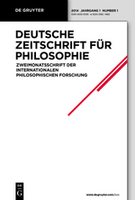
DEUTSCHE ZEITSCHRIFT FUR PHILOSOPHIE
Championing philosophical thought for over seven decades.DEUTSCHE ZEITSCHRIFT FUR PHILOSOPHIE is a prominent academic journal dedicated to advancing the field of philosophy, published by WALTER DE GRUYTER GMBH. Since its inception in 1953 and extending its converged years to 2024, it has been a pivotal platform for scholarly discourse, fostering critical thought and innovative ideas in philosophical studies. With its ISSN 0012-1045 and E-ISSN 2192-1482, the journal holds a commendable position in the academic community, recognized as a Q2 journal in the 2023 Philosophy category, currently ranked #390 out of 806 in the Scopus Arts and Humanities rankings, placing it in the 51st percentile. Although it does not offer open access, its commitment to rigorous peer review ensures that each publication meets high academic standards, making it an invaluable resource for researchers, professionals, and students seeking to engage with contemporary philosophical debates and theories. The journal is situated in Berlin, Germany, at Genthiner Straße 13, D-10785 Berlin, Germany, and continues to be an essential outlet for philosophical inquiry and scholarly achievement.
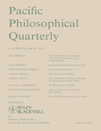
PACIFIC PHILOSOPHICAL QUARTERLY
Fostering Insightful Dialogues in PhilosophyWelcome to the PACIFIC PHILOSOPHICAL QUARTERLY, a leading journal in the field of philosophy, published by Wiley. With an impressive impact factor and ranked in the top 15% of its category (Q1 in Philosophy), this esteemed journal has become a vital source for scholars and practitioners alike. Established in 1996, the journal presents groundbreaking articles that explore contemporary philosophical issues, ensuring its relevance through converged contributions up to 2024. With robust Scopus rankings, including a position of #122 out of 806 in the Arts and Humanities category, the quarterly serves as a platform for innovative ideas and rigorous debates in the philosophical community. Though it does not offer open access, its insights are invaluable for researchers, professionals, and students eager to deepen their understanding of philosophical discourse.

Filosofia Unisinos
Illuminating Diverse Perspectives in PhilosophyFilosofia Unisinos, an esteemed journal in the field of Philosophy, is published by the Universidade do Vale do Rio dos Sinos (UNISINOS) in Brazil. Since its inception, the journal has embraced an Open Access approach, welcoming contributions from scholars globally. With its ISSN 1519-5023 and E-ISSN 1984-8234, it has positioned itself as a vital resource, showing consistent growth in academic circuit, reflected by its Q3 Quartile ranking in the 2023 Scopus category for Philosophy, indicating its relevance and contribution to the discipline. Covering a broad range of philosophical inquiries, from theoretical frameworks to contemporary interpretations, the journal offers a platform for rigorous scholarly dialogue and fosters innovative research. As it moves towards its convergence year in 2024, Filosofia Unisinos continues to be pivotal for researchers, professionals, and students interested in exploring the multifaceted landscape of philosophical thought.
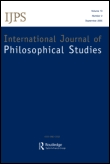
INTERNATIONAL JOURNAL OF PHILOSOPHICAL STUDIES
Pioneering Research in Philosophical InquiryINTERNATIONAL JOURNAL OF PHILOSOPHICAL STUDIES, published by Routledge Journals, Taylor & Francis Ltd, is a premier scholarly journal dedicated to the exploration of philosophical inquiry in its diverse forms. Established in 1993, this journal has significantly contributed to the field of Philosophy, currently positioned in the Q2 category of the 2023 rankings, reinforcing its reputation as a pivotal resource for thought-provoking discussions and analyses. With an impressive Scopus Rank of 227 out of 806 in the Arts and Humanities department, this journal achieves a commendable 71st percentile ranking, underscoring its relevance and impact within the academic community. The journal's primary objective is to publish original research that fosters dialogue and debate among scholars while engaging with contemporary philosophical issues. Despite being a traditional subscription-based journal, it remains committed to disseminating high-quality research that shapes the philosophy landscape. For researchers, professionals, and students alike, the INTERNATIONAL JOURNAL OF PHILOSOPHICAL STUDIES is an essential venue for advancing knowledge and understanding in this critical field.

SYNTHESE
Illuminating the intersection of philosophy and society.SYNTHESE is a prestigious academic journal published by Springer, renowned for its contributions to the fields of Philosophy and Social Sciences. With a distinguished history dating back to its inception in 1936, this journal continues to thrive, offering a platform for innovative and critical discourse. Recognized for its excellence, SYNTHESE holds a remarkable Q1 quartile ranking in both Philosophy and Social Sciences (miscellaneous) as of 2023, placing it within the top tier of scholarly publications. Its impressive Scopus rankings further underscore its influence, boasting a rank of #48 out of 806 in Philosophy and #70 out of 275 in General Social Sciences, thereby reflecting a 94th percentile in the arts and humanities. The journal's scope encompasses a wide array of interdisciplinary and philosophical inquiries, making it a vital resource for researchers, professionals, and students seeking to deepen their understanding of complex social issues. With access options that promote scholarly connectivity, SYNTHESE is committed to advancing knowledge and fostering intellectual engagement within the global academic community.
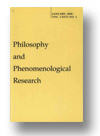
PHILOSOPHY AND PHENOMENOLOGICAL RESEARCH
Cultivating Insight through Rigorous Academic InvestigationPHILOSOPHY AND PHENOMENOLOGICAL RESEARCH, published by Wiley, stands as a premier journal within the realms of Philosophy and the History and Philosophy of Science, boasting an impressive Q1 ranking in both categories as of 2023. With the ISSN 0031-8205 and E-ISSN 1933-1592, this esteemed journal has been a pivotal platform for philosophical inquiry since its inception in 1970. Dedicated to advancing understanding in phenomenology and its implications across various disciplines, the journal encourages scholarly discourse through high-quality peer-reviewed articles that explore both classical and contemporary philosophical thought. With a Scopus ranking of #46 in Philosophy and #20 in the History and Philosophy of Science, PHILOSOPHY AND PHENOMENOLOGICAL RESEARCH operates at the confluence of rigorous academic investigation and innovative ideas, making it an indispensable resource for researchers, professionals, and students alike. As part of its commitment to facilitating scholarly communication, the journal does not currently offer open access but ensures accessibility through various institutional subscriptions. Discover the rich tapestry of philosophical inquiry that shapes our understanding of the world in its pages.

Ethical Theory and Moral Practice
Advancing Insightful Discussions on Ethical TheoryEthical Theory and Moral Practice is a distinguished academic journal published by SPRINGER, focusing on the intricate intersections of ethics, morality, and social philosophy. With an ISSN of 1386-2820 and E-ISSN 1572-8447, it has been a vital platform for scholarly discourse since its inception in 1999, converging its publication years from 1999 to 2002 and then from 2004 to 2024. The journal holds an impressive standing in the academic community, reflected by its Q1 ranking in Philosophy and Q2 in Social Sciences (miscellaneous) for 2023, as well as its notable Scopus rankings in both Arts and Humanities and Social Sciences. Despite being a subscription-based journal, it plays a crucial role in shaping contemporary ethical discussions and provides researchers, professionals, and students with insightful analysis and innovative approaches to moral issues facing society today. Its commitment to advancing understanding in these essential fields underscores its significance as a leading resource for scholars dedicated to exploring moral practice and ethical theory.
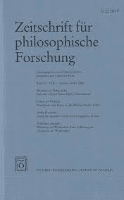
ZEITSCHRIFT FUR PHILOSOPHISCHE FORSCHUNG
Connecting Minds Through Thought-Provoking Philosophical Dialogue.ZEITSCHRIFT FUR PHILOSOPHISCHE FORSCHUNG is a prestigious academic journal published by Vittorio Klostermann GmbH in Germany, dedicated to the interdisciplinary field of philosophy. With its ISSN 0044-3301 and E-ISSN 1439-2615, this journal has made significant contributions to the philosophical discourse since its inception in 1977, continuing its pursuit of excellence in scholarship through 2024. Recognized in the 2023 category quartiles as Q2 in Philosophy, it is ranked #498 out of 806 in the Arts and Humanities' Philosophy classification by Scopus, placing it in the 38th percentile. Although it currently does not offer open access options, its rigorous peer-reviewed articles serve to enrich the scholarly community's understanding of complex philosophical issues. ZEITSCHRIFT FUR PHILOSOPHISCHE FORSCHUNG plays a vital role in advancing philosophical research in a collaborative academic environment, making it a valuable resource for researchers, professionals, and students alike.
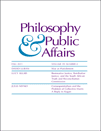
PHILOSOPHY & PUBLIC AFFAIRS
Advancing Ethical Discourse in Public LifePHILOSOPHY & PUBLIC AFFAIRS is a prestigious academic journal published by Wiley, renowned for its rigorous exploration of the intersections between philosophical inquiry and pressing public issues. Since its inception in 1973, this journal has become a leading platform in the fields of history and philosophy of science, political science and international relations, and social sciences, achieving a remarkable Q1 ranking across these domains in 2023. With substantial impact reflected in its Scopus rankings—16th in Arts and Humanities for History and Philosophy of Science and 99th in Social Sciences for Political Science—the journal serves as an essential resource for researchers, professionals, and students seeking to engage with influential ideas and contemporary debates. While the journal is not currently open access, it continues to broaden the discourse surrounding ethical governance, civic engagement, and global justice through its diverse range of published articles. For scholars striving to deepen their understanding of vital societal challenges, PHILOSOPHY & PUBLIC AFFAIRS promises invaluable insights and a compelling intellectual experience.